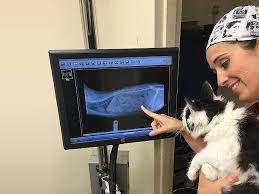In Search of Compassion Care-Donald H DeForge, VMD
Donald H DeForge, VMD
www.SilverSandsVeterinary.com
1-800-838-3368
Medical Director Silver Sands Veterinary; House Calls for Pets Silver Sands and
Centers for Oral Care-Tri-State Referrals in Oral Medicine and Oral Surgery
Fellow of the Academy of Veterinary Dentistry
President of the Society for Veterinary Medical Ethics
#DrDonDeForge
#SilverSandsVeterinary

In Search of Compassionate Care
D. DeForge, VMD
The below essay was written by Mara Fionese and Stefano Alice-Family Medicine.
Take a moment and read it carefully.
As President of the Society for Veterinary Medical Ethics, I seek to bring the words of the Royal College of General Practitioners motto to veterinary medicine:
Cum Scientia caritas-Compassion and Knowledge.
I begin, today, a campaign to make veterinary medical care more compassionate!
Veterinary medical students and human medical students become demoralized by an impersonal system before they begin their journey.
This is a pedagogical mistake due to a depersonalizing education system: unconcerned and unable to give full support to students, leaving them alone and without a role model.
As Fionese and Alice state: Compassion isn't a single, sympathetic utterance, but is rather made up of presence and engagement that suffuses an entire conversation.
Rollo May, psychologist and theologian, applies the Greek word “agape” or the Latin “caritas” to compassion to underline what is essential in a therapeutic relationship: an emotion of regard and affection (it applies to both “agape” and “caritas”). He shares the Royal College of General Practitioners’ (RCGP) point of view, whose motto is: “Cum Scientia caritas - Compassion with Knowledge”. It all seems to fit.
Read the words of this age-old song from Disney. Then reflect on how compassionate care can enter into your life today!
www.SilverSandsVeterinary.com
1-800-838-3368
Medical Director Silver Sands Veterinary; House Calls for Pets Silver Sands and
Centers for Oral Care-Tri-State Referrals in Oral Medicine and Oral Surgery
Fellow of the Academy of Veterinary Dentistry
President of the Society for Veterinary Medical Ethics
#DrDonDeForge
#SilverSandsVeterinary
In Search of Compassionate Care
D. DeForge, VMD
The below essay was written by Mara Fionese and Stefano Alice-Family Medicine.
Take a moment and read it carefully.
As President of the Society for Veterinary Medical Ethics, I seek to bring the words of the Royal College of General Practitioners motto to veterinary medicine:
Cum Scientia caritas-Compassion and Knowledge.
I begin, today, a campaign to make veterinary medical care more compassionate!
Veterinary medical students and human medical students become demoralized by an impersonal system before they begin their journey.
This is a pedagogical mistake due to a depersonalizing education system: unconcerned and unable to give full support to students, leaving them alone and without a role model.
As Fionese and Alice state: Compassion isn't a single, sympathetic utterance, but is rather made up of presence and engagement that suffuses an entire conversation.
Rollo May, psychologist and theologian, applies the Greek word “agape” or the Latin “caritas” to compassion to underline what is essential in a therapeutic relationship: an emotion of regard and affection (it applies to both “agape” and “caritas”). He shares the Royal College of General Practitioners’ (RCGP) point of view, whose motto is: “Cum Scientia caritas - Compassion with Knowledge”. It all seems to fit.
If you were to comb through scientific literature, you may notice that there’s something capable of reducing post-operative pain, boosting the survival chance of cancer patients, lowering the mortality rate in high risk cardiac patients and cutting the hospitalization rate for diabetics. As if that wasn’t enough, it also boosts the immune system.
So what is this mysterious substance? It’s compassion, or better still, compassionate doctors. Before you stop reading, don’t make the mistake of confusing compassion with pity or commiseration.
Compassion isn't a single, sympathetic utterance, but is rather made up of presence and engagement that suffuses an entire conversation.
The importance of compassion may unsettle doctors who think their duty is to be technically proficient and up-to-date, those who think that it’s a natural quality you either have or don’t have, as well as certain ethicists who think that doctors need to maintain a professional distance from their patients. [Not all ethicists believe this-D DeForge, VMD]
But it is central to the welfare of patients. Dr. Robert Youngson, an anaesthesiologist, has launched a campaign to make healthcare more compassionate. According to his research, there are two type of doctors who fit the profile:
1) Empathetic doctors: those who naturally grasp that the whole point of empathy is to focus attention on the patient.
2) Doctors who have successfully attended a doctor patient communication skills course. Communication skills can be taught.
For example, a good technique for showing compassion, is simple: 3 T’s. Talk or listen, take time and touch. Merely taking the time to talk and listen to patients is comforting, as is a doctor’s touch.
Moreover, we must leave our empathetic abilities to guide us through our work, we should develop our compassion as a gift everyone can use.
How many doctors have become cold and distant after losing their freedom and being forced to work as small cogs in a big machine? How many students have become unenthusiastic or demotivated before even getting their medical degree? This is a pedagogical mistake due to a depersonalizing education system: unconcerned and unable to give full support to students, leaving them alone and without a role model.
Scientific literature proves that this argument can be applied both to single professionals and organisations. Personality, values and behaviour reflect individual performances, which are the road to failure or success for each organisation. The doctor-patient relationship is part of the healing process
Biologically speaking, empathy can be explained by "Mirror neurons." These are a type of brain cell that fires when someone performs an action, and also when a person watches someone else performing the same action.
They were discovered back in the 90s, by a team of Italian researchers who found individual neurons in the brains of monkeys that fired both when the monkeys grabbed an object and also when the monkeys watched another primate grab the same object.
But mirror neurons also exist in the brain areas that are in charge of emotions.
This means that we are able to recognize other people’s emotions simply by observing them. When we observe someone, these mirror neurons are activated and allow us to at least partly feel the emotions that the person we are observing is feeling.
These “empathic” mirrors are triggered both when we experience an emotion and when we observe somebody who is experiencing the same emotion. This extraordinary achievement provides the neurophysiological grounds for empathy.
“It’s the relationship that heals”, says Dr. Irvin D. Yalom, Psychiatry professor at Stanford University; he underlines the importance of qualitative relationships over theory. A relationship is strictly personal, a good relationship is based on care and the will to relieve patients’ suffering.
According to the American psychologist Carl Rogers, there are three main ingredients to a good doctor-patient relationship: empathy, honesty and genuineness.
Rollo May, psychologist and theologian, applies the Greek word “agape” or the Latin “caritas” to compassion to underline what is essential in a therapeutic relationship: an emotion of regard and affection (it applies to both “agape” and “caritas”). He shares the Royal College of General Practitioners’ (RCGP) point of view, whose motto is: “Cum Scientia caritas - Compassion with Knowledge”. It all seems to fit.
If we work on patient-centered care, if the patient himself feels that he’s taken seriously and the doctor addresses his needs, this will lead to reduced healthcare waste.
Our purpose is to stimulate a debate on how to improve medical training, given the positive results of the researches; a debate on being both up-to-date and compassionate.
At the edge of the Fourth Industrial Revolution, a wave of digital-era change, compassion is still a valuable tool for those who want to shape innovations rather than being overwhelmed by them.
Read the words of this age-old song from Disney. Then reflect on how compassionate care can enter into your life today!
When a star is born
They possess a gift or two
One of them is this
They have the power to make a wish come true
One of them is this
They have the power to make a wish come true
When you wish upon a
star
Makes no difference who you are
Anything your heart desires will come to you
Makes no difference who you are
Anything your heart desires will come to you
If your heart is in
your dream
No request is too extreme
When you wish upon a star
As dreamers do
Fate is kind
No request is too extreme
When you wish upon a star
As dreamers do
Fate is kind
She brings to those
who love
The sweet fulfillment of their secret longing
The sweet fulfillment of their secret longing
Like a bolt out of the
blue
Fate steps in and sees you through
When you wish upon a star
Your dreams come true
Fate steps in and sees you through
When you wish upon a star
Your dreams come true
When you wish upon a
star
Makes no difference who you are
Anything your heart desires will come to you!
Questions on this blog?
Write #DrDonDeForge at: DonDeForge100@gmail.com
Makes no difference who you are
Anything your heart desires will come to you!
Questions on this blog?
Write #DrDonDeForge at: DonDeForge100@gmail.com

Comments
Post a Comment